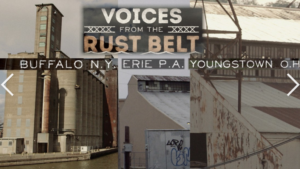Occasionally I'll use this space to offer book suggestions in case you find yourself in need of reading material. This is less a suggestion than an assignment. This will be on the test.
Mike Konczal gave me a heads-up on Evicted: Poverty and Profit in the American City, a non-fiction tale of people in Milwaukee living on the bottom rung of the housing market: black families in the north side ghetto and white families in a trailer park that sits literally atop a biohazard. For a casual reader this book is a Rorschach Test, a study in confirmation bias; whatever your existing beliefs about the root causes of poverty and the underclass, you will find ample evidence to support it here. The most remarkable achievement is the ability of these stories to make the reader sympathize with everyone involved. You feel for the poor single parent living in a house with no refrigerator; then you feel for the landlord who stopped putting in refrigerators after six of them were destroyed or sold for beer money. You feel for the people who have to clean up foreclosed, abandoned, or evicted houses that resemble landfills. For a few pages I even felt bad for the cops – Milwaukee cops.
I've never read anything that had me teetering back and forth quite like this. You understand why people feel less than human living in an apartment with no appliances and no front door; a paragraph later, you understand the frustration of replacing the front door 17 times in 5 years for tenants who pay rent a few times annually at best and will end up destroying anything you put in the apartment. The tenants give up. The landlords give up. The agencies intended to deal with these social problems give up. And eviction, which used to be about as common as a solar eclipse fifty years ago, becomes so common and frequent as to be routine. If you believe the system is the problem, this book will reinforce that. If you believe individual responsibility is the problem, this book will do the same for you.
The obvious poverty red flags are well represented: joblessness, the paltry income afforded by what jobs are found (either fast food, nursing home cleanup, or cash-in-hand day labor are about it), the drugs – alcohol – cigarettes troika that eats up so much money, bad personal decisions, and lack of education. Rather than beat those dead horses, there are two things that have been on my mind since reading this.
One, and there's no way to say this without sounding like a judgmental asshole, is the role of family planning in exacerbating the already dire situations in which these people find themselves. You practically want to scream at the pages, please stop having more kids. There are numerous tales of people living on something like $650/month in total income…and they have three kids, and they have more kids as the story unfolds. There are a lot of issues balled up here: lack of effective sex education (in or out of school), lack of sufficient access to methods of birth control, and using children to fill an emotional void or try to hold onto a relationship partner. I can't put myself in the position of anyone in this book, and I have no idea what I'd do if I were. But if there's one thing the people described here are good at, it's figuring out how to survive. In many ways they are highly rational and they make decisions that eliminate anything that isn't absolutely essential. In that light, it's confusing to try to understand why "I shouldn't pay this month's rent because I'm about to be evicted anyway" makes sense (and it does) but "I shouldn't have a fifth child" does not.
The second is another foreign concept to me because I have an extremely small family. I have one sibling, no living grandparents, one aunt, and no cousins. In many of these (often enormous) poor families, there is a moral dilemma facing the one or two people who become financially stable. I can see how compassion fatigue would set in. How many times do you pay the past-due rent for your brother, knowing that in three months he'll be back asking for it again? You'd either become a hard-hearted bastard, telling your own immediate family members to piss off, or you'd help out until inevitably your relatives pulled you right back down into poverty with them. You can only hand over $500 for emergencies so many times before you have your own emergencies and find yourself without a safety net. These stories made me very thankful to never be put in that situation, and even more empathetic toward friends who regularly are in it. How many times can you hand over what ends up being beer money? And how do you sleep at night after you stop doing it?
It's not a fun read, but it's an excellent one. Most people do not realize – and here I do have a tiny bit of insight, having spent three years working in debt collection – that there is an entire Poverty Industry built up around extracting money from people in desperate situations. You need $100 in the next hour to keep your house? Payday loan at 25%. You've been evicted? Your stuff will be taken to storage and it'll run you $500 to get it back. You're at the end of your rope? Don't worry, there's a liquor store on every corner; sometimes two. You finally have some work? Well since you live in squalor and around constant violence, here are some expensive medical problems.
It is a machine, and nobody who gets caught in the gears ever gets out. You might be fooling yourself if you think you have any idea how to begin fixing this.
